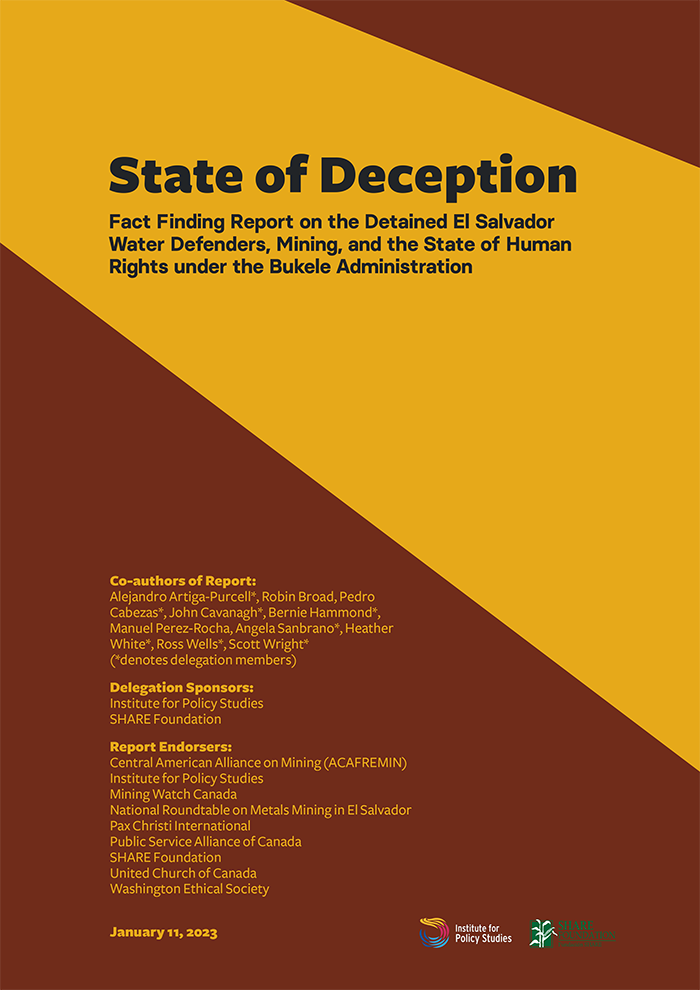State of Deception
A fact-finding report on El Salvador’s detained water defenders, the potential return of environmentally destructive mining, and the state of human rights under the Bukele administration.
Alejandro Artiga-Purcell | Robin Broad | Pedro Cabezas | John Cavanagh | Bernie Hammond | Manuel Perez-Rocha | Angela Sanbrano | Heather White | Ross Wells | Scott Wright
Introduction
A year ago this January, five water defenders were arrested in El Salvador.
The “Santa Marta Five” led a successful national campaign to ban environmentally destructive mining in the Central American country several years ago. We believe their arrest signals both a crackdown on civil society under the increasingly authoritarian president Nayib Bukele and a signal that Bukele may seek to resume metal mining operations — in part to offset costs incurred by his own disastrous economic policies, including the adoption of Bitcoin as a national currency.
From October 15 to October 20, 2023, several of us joined a U.S.-Canadian delegation to El Salvador. We held 19 meetings with leaders of civil society groups, human rights groups, lawyers, economists, a member of the legislature, and others in the country.
The delegation visited organizations in the department of Cabañas, specifically in San Isidro, Guacotecti, Victoria, and Santa Marta. The delegation also participated in a ceremony to mark the 40th anniversary of the human rights organization, Tutela Legal Maria Julia Hernandez, and to present that organization with the 2023 Institute for Policy Studies Letelier-Moffitt Human Rights Award.
Overall, we were shocked at the level of fear, suffering, and corruption in the country amid Bukele’s “state of exception.” Our interviews in El Salvador indicate that the country is now a police state. With elections just a month out, the government of El Salvador has moved systematically in the direction of becoming a dictatorship — with the arbitrary arrest and imprisonment of the Santa Marta Five only the tip of the iceberg.
This is a report of the delegation’s findings, which are available in full in both English and Spanish. An English-language summary follows here.
Key Findings
- Among the over 70,000 people that Salvadoran President Nayib Bukele has incarcerated under abysmal conditions and the use of torture are tens of thousands of innocent people, including five water defenders and numerous labor leaders. No evidence has been presented by the government to back the arrest of the five water defenders, and charges against them should be dropped under a 1992 amnesty.
- There is compelling evidence that President Bukele desires to violate a unanimous 2017 vote in the Salvadoran legislature to prohibit mining, a move that would endanger the country’s water supply and violate the public will.
- President Bukele has taken a series of steps to reduce the independence of the judiciary, to violate basic human rights, and to suspend civil liberties and the rule of law in the name of protecting the population from the violence caused by gangs. He is starving city governments of finances while expanding the military and is diverting millions of dollars borrowed from abroad for his cronies.
- Representatives of the executive branches of the governments of the United States, Canada, Mexico, and the European Union have chosen to ignore these massive violations of human rights as they drop their criticism of Bukele’s actions and supply financial aid to his government.
We urge the Salvadoran government to:
- Drop the charges against the Santa Marta Five.
- Withdraw the state of emergency and implement a real public security policy.
- Re-establish suspended rights.
- Restore the independence of the different branches of the state: executive, legislative, and judiciary.
- Maintain the prohibition on metallic mining.
We urge the governments of the United States and Canada to:
- Demand that El Salvador drop charges against the Santa Marta Five based on the rule of law, due process, democracy, and human rights, as well as the 1992 Peace Agreement and National Reconciliation Law, which is still in full force to this day.
- Attend, as international observers, all upcoming trials of the Santa Marta Five. If attendance at the trial proceedings is not possible, the Embassy’s request to attend would be a significant demonstration of international interest and concern.
- Call for a return to democracy in El Salvador, the cancellation of the “state of exception,” and the restoration of the independence of the different branches of the state.
- Instruct the U.S. and Canadian IMF Executive Directors to vote no on Bukele’s request for a $1.3 billion loan.
We urge the Canadian government in particular to implement these recommendations as an integral part of “Voices at Risk: Canada’s Guidelines on Supporting Human Rights Defenders.” And we urge the U.S. government to diligently implement Assistant Secretary of State Nichol’s October 2023 comment about the U.S. government’s “unbreakable commitment to supporting and protecting civil society actors in El Salvador.”
Finally, we call on the government of Mexico (and Spain, Colombia, and Venezuela) to:
- State your intent to protect the commitments made in the Peace Agreement signed in 1992 in Mexico City. It was negotiated under the auspices of the Secretary General of the United Nations and was signed by representatives of the government of El Salvador and the FMLN insurgency.
- The president of Mexico, Andres Manuel López Obrador, should uphold what he expressed in May 2022, when he visited El Salvador, that the peace agreement “is a source of pride for us Mexicans, because those agreements were signed in Chapultepec Castle, in Mexico City.”
- Mexico should lead the defense of the Peace Agreement and urge Spain, Colombia, and Venezuela, who acted as friends of the Secretary General in the peace process, to lead as well.

Read our Press Release in English or en Español
Media Contacts:
Olivia Alperstein
olivia@ips-dc.org
202-787-5205
